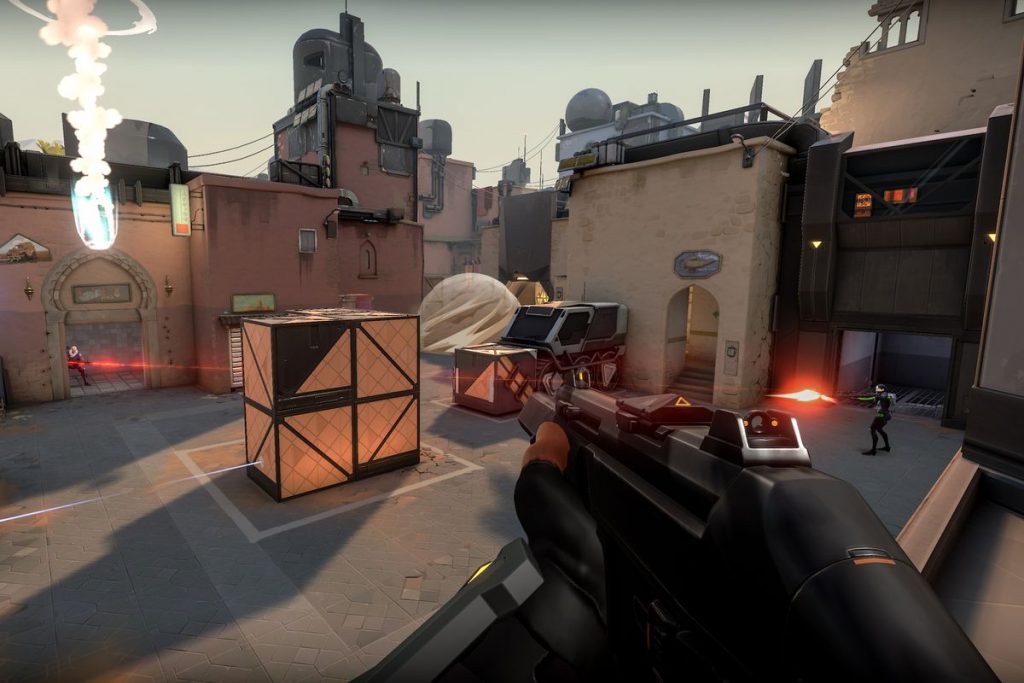For weeks now, we’ve heard everyone associated with Riot’s Valorant describe it as a blend of Overwatch and Counter-Strike. It appeared to be a game that featured unique characters with special abilities but emphasized gunplay, tactics, and teamwork above all.
Now that Valorant has entered closed beta and thousands have gotten the chance to play the game, we can confirm that description is very much accurate. Unfortunately, that could be bad news for a generation raised on Fortnite and Call of Duty.
First off, Valorant may combine elements of Overwatch and Counter-Strike, but the ratio so far appears to be 90% Counter-Strike and about 10% Overwatch. It might even be a little more weighted towards Counter-Strike than that. Yes, Valorant features characters with unique abilities and ultimates, but so far, the impact of those abilities has been relatively minor compared to what we see in other, similar shooters.
What you’re left with, then, is a game that emphasizes nearly every point that set Counter-Strike apart way back in 1999. It features fast-paced gameplay without respawns (at least in most cases) that demands you coordinate with your team and possess some truly exceptional aim and awareness.
The funniest thing about Valorant‘s gameplay isn’t that it apes Counter-Strike but that it’s one of the few games that has been released since Counter-Strike to truly do so. Counter-Strike was a significant departure from the more popular fast-paced arena shooters of its era. While that particular style is no longer dominant, more competitive shooters released since its debut have leaned towards things like abilities, respawns, and even light RPG elements.
For a generation of fans who grew up in the time of Halo, Call of Duty, and even Fortnite, that could be a big problem when it comes to truly “getting” Valorant.
Let’s be clear right now: this is not a matter of trying to say that people who play those kinds of games aren’t skilled enough to play Valorant. Many of them (certainly the best among them) may indeed be able to adapt to the game.
However, Valorant emphasizes such a different set of skills from most other popular shooters of the last 20 years or so that we can only imagine there will be a lot of people who try it, die over and over again, and are left with the conclusion that they are either doing something wrong or that the game just isn’t good. We’re already seeing this effect among some streamers and other players who never really got into the Counter-Strike scene and are clearly struggling to make the transition.
This is quite honestly a huge hurdle for Valorant. Just the fact that the game is clearly designed to be played on a mouse and keyboard when so many shooters have made concessions designed to accommodate console controller play is enough to potentially put off people who can’t make pixel-perfect shots in tense situations.
Mechanics aside, Valorant requires you to rely on an entirely different mindset than other shooters. Unlike Call of Duty and Fortnite where it’s either every man for themselves or team modes that rarely require coordination, Valorant demands almost constant communication. Unless you are so much more mechanically gifted than your opponents, you will need to be aware of what your teammates are doing, what equipment they’re buying, and why that person just died.
There’s also the issue of the frustration this style of gameplay naturally causes. Dying in Fortnite feels bad, but the nature of the battle royale genre means that you almost kind of expect to die at some point and just hop into a new game. Call of Duty can get really annoying, but you’re usually just a respawn away from getting back into the action.
Valorant constantly reminds you of the fact that you’re not playing well enough via quick deaths that often come from unseen foes. Much like Dark Souls, it tries to tell you what you’re doing wrong by killing you every time you don’t do something right. While that can be very rewarding, we don’t blame people who don’t find that style to be particularly fun.
And that’s what makes this whole situation so fascinating. In Valorant, Riot has used their considerable resources to develop a shooter with mechanics that could be described as niche despite the popularity of Counter-Strike. Valorant continues to gain momentum throughout its early access period, but what happens when the general public loses their first several matches and walk away from the game entirely. For that matter, what happens if Valorant isn’t even able to win over the Counter-Strike crowd?
We’ll find out the answers to these questions soon enough, but one thing is clear right now. If you go into Valorant expecting it to chase the ideas of existing popular games, you’re going to have a bad time.





